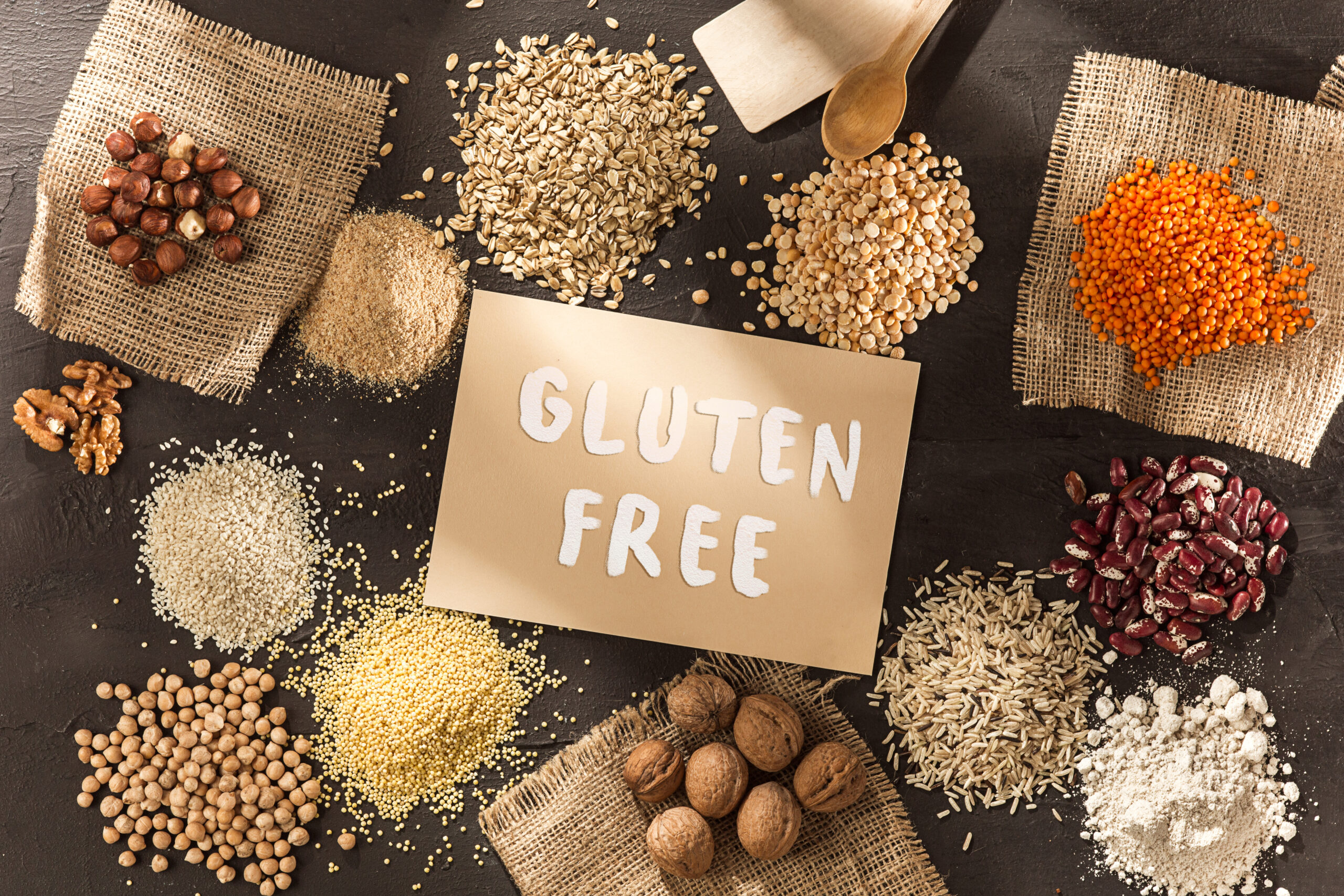Some of the links on this page are affiliate links, which means that Buzzy Kitchen earns commission from purchases made – at absolutely no extra cost to you. Thank you so much for supporting Buzzy Kitchen!
Tired of using the same old substitutions when it comes to gluten free alternatives for plain flour? Don’t you worry, friends: I’ve got 22 different substitutions for you to take a peek at – but that’s not all. I’m telling you what they’re good for, how to use them, and how much of them to use.
Are you sitting comfortably? Ready to begin?
22 Gluten Free Substitutions for Plain Flour
You might be surprised to learn that there are actually quite a few substitutions you could make, if you’re looking for something gluten-free to use in place of regular ol’ plain flour.
Let’s take a look at what will and won’t work if you need gluten-free flour alternatives for plain flour (and where you can buy them all from):
1 – Gluten-Free Plain Flour
You can actually buy plain flour that is gluten-free now. I’ve found it in the Asda Free From range, and Doves Farm has a version, too: FREEE by Doves Farm Plain White Gluten-Free Flour.
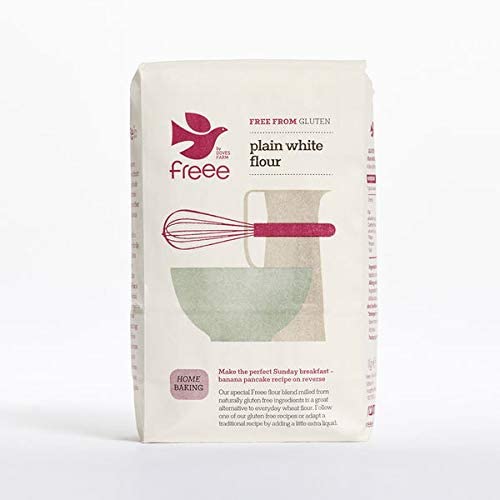
Gluten free
Kosher certified
Generally, you can substitute regular plain flour with gluten-free plain flour on a 1:1 basis, but I always recommend having a good read of the packaging to make sure. As always, add a little less, because you can always add a little more if you need to. You can’t take flour away once you have incorporated it into the dish!
2 – Coconut Flour
One great substitution for plain flour, if you’re looking for a gluten-free option, is coconut flour – which is naturally gluten-free.
Coconut flour absorbs a lot of moisture, so things might be a little trickier when adding it to cakes or bread-based goods. It is also thicker in consistency, which means you’ll probably need to tweak the recipe.
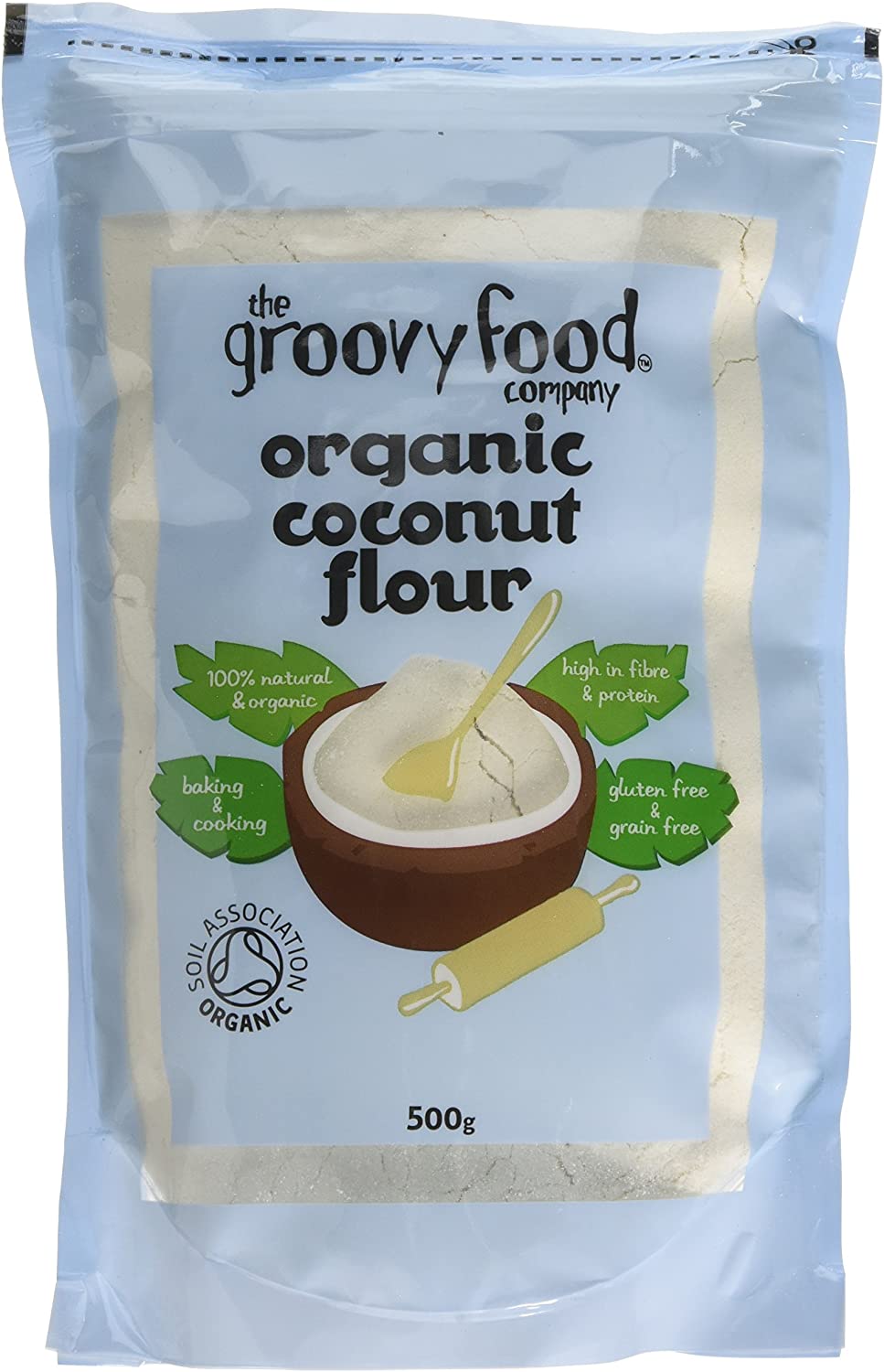
100 % Organic Defatted Coconut Flour
100% Natural & Organic
High in fibre & protein
Gluten free & grain free
You will usually need to add more water/fluid, and it is sometimes recommended to add an extra egg, if the recipe calls for eggs to start with.
3 – Gram Flour
Gram flour is also naturally gluten-free, and it’s one of the healthiest types of flour too. It has fewer calories than most others, and it is loaded with healthy protein, and the carb-count is low.
It’s already sounding like a pretty good option, right?
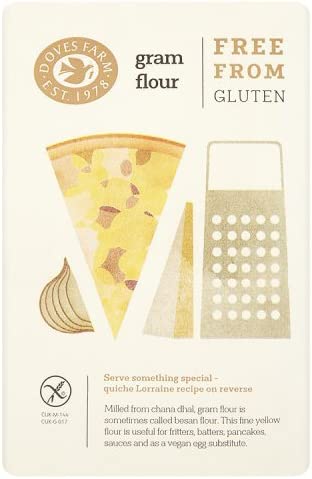
Gluten free
Wheat free
Unbleached
Kosher certified
You will definitely need to tweak the recipe if you use gram flour, also known as besan flour, as a substitute for all purpose or plain flour. It has a higher density, and it is a lot rounder and rougher in grain size and shape.
4 – Millet Flour
Millet flour, another gluten-free flour, can change the way your baked goods taste – and it’s better for those with diabetes than most other types of flour.
Millet flour offers a slightly nuttier finish than other types of flour, and it’s also a bit sweeter. The taste has been likened to sweetcorn (or corn, if you’re reading this in the US). Because of this sweetness, millet flour is best used in sweeter dishes, such as cakes and cookies.
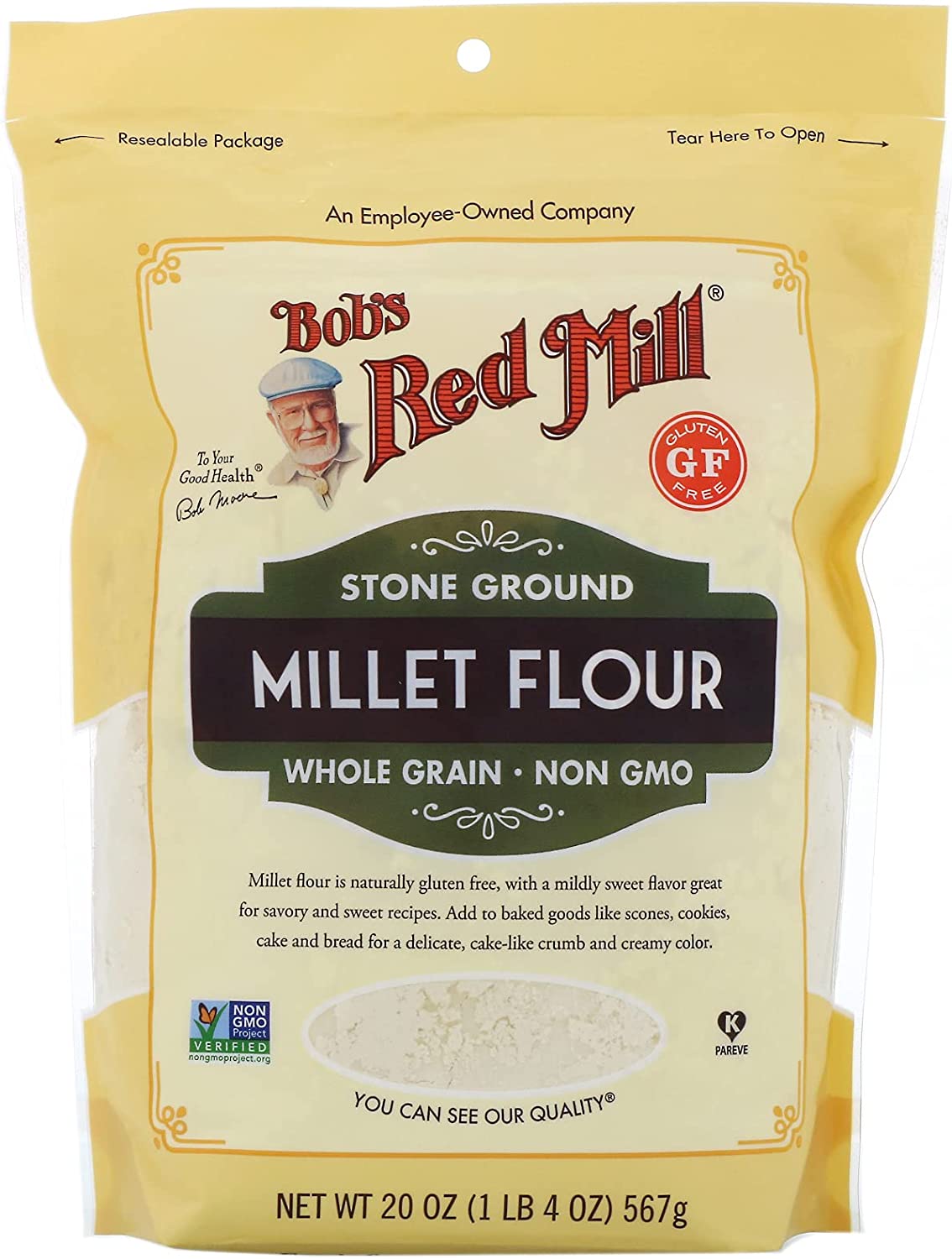
100 % Organic Defatted Coconut Flour
100% Natural & Organic
High in fibre & protein
Gluten free & grain free
As well as having a different taste to plain flour, millet flour is different in texture, too. It can make baked goods like bread quite heavy and thick, and almost stodgy in nature. It is better suited to flatbreads, such as Indian roti bread alongside noodle-style pasta dishes and pizza dough.
You can substitute plain flour for millet flour in a straight 1:1 swap, but it is a much better idea to add a little less millet flour, then add a little more if necessary. Throwing too much in, too soon will result in a thick mess than won’t rise or cook half as well as you expect it to.
Many people prefer to blend millet flour in with other types of gluten-free flour for a better alternative to plain flour. Sometimes, millet flour on its own, although quite sweet, can give a baked dish an almost bitter aftertaste.
5 – Quinoa Flour
Quinoa flour, and just quinoa in general, has grown in popularity over recent years – and for good reason! As well as being naturally gluten-free, this type of flour is bold and strong in a number of ways. There are a couple of things you should know about it, if you plan on using it as a plain flour substitute.
Firstly, quinoa has a distinct taste, and quite a strong one at that.
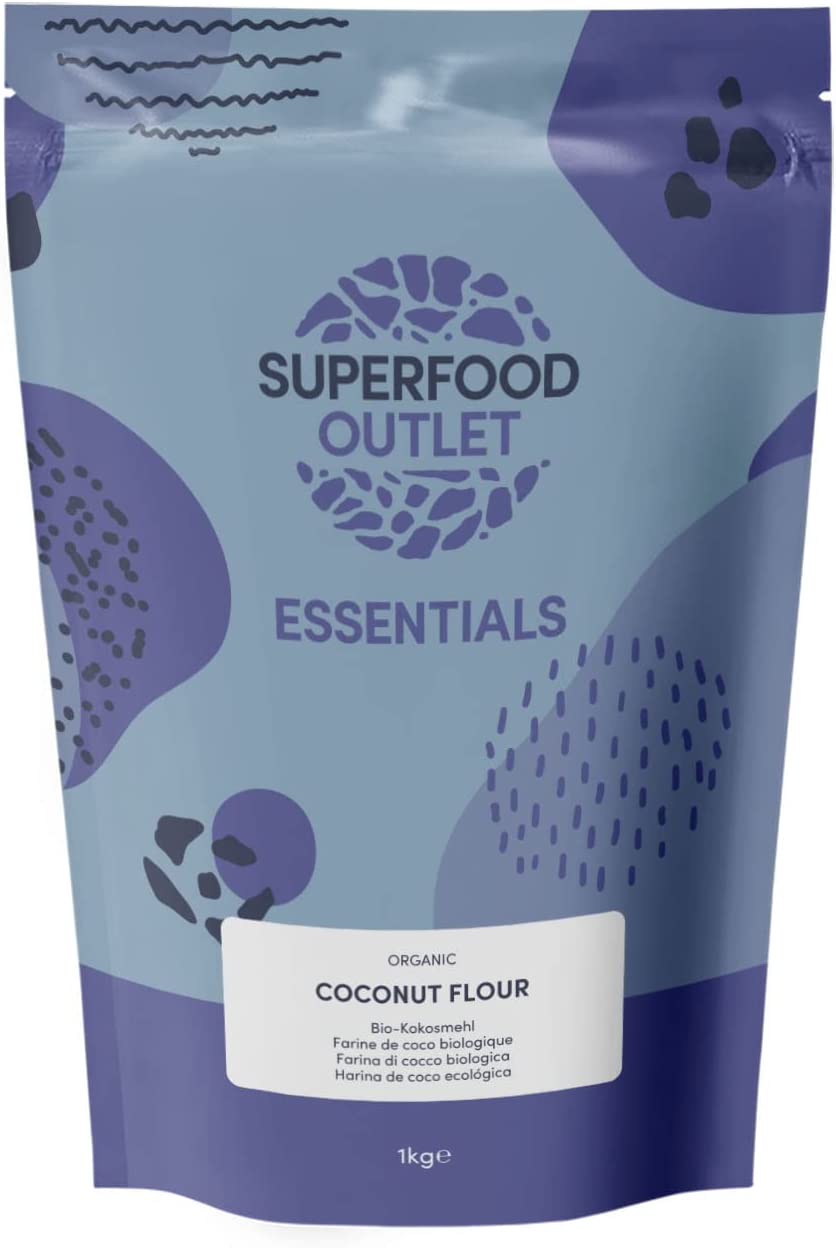
Gluten free
Vegan-friendly
Kosher certified
100% Natural & organic
Secondly, it’s not great as a 1:1 swap in baked or sweet goods. Anything that requires sticking-together will need another flour mixed in with the quinoa flour to keep it all together. Otherwise, you might find that the entire thing just falls apart when it has finished cooking.
You can use quinoa flour in a 50/50 mix with another type of gluten-free flour, such as almond flour. So, if a recipe calls for 100g of plain flour, you can add a mix of 50g of quinoa flour and 50g of almond flour.
(You will also want to heed the warnings and potential recipe tweaks for almond flour too, though.)
6 – Almond Flour
Also known as almond meal, almond flour is another type of flour you can usually just swap with plain flour on a 1:1 ratio, but, as always, check the packaging before you add some to the recipe, just to be on the safe side.
There are a few recipe tweaks you may wish to consider making when using almond flour as a substitution for plain flour. If you’re using a recipe that calls for eggs, for example, you may wish to add in an extra egg.
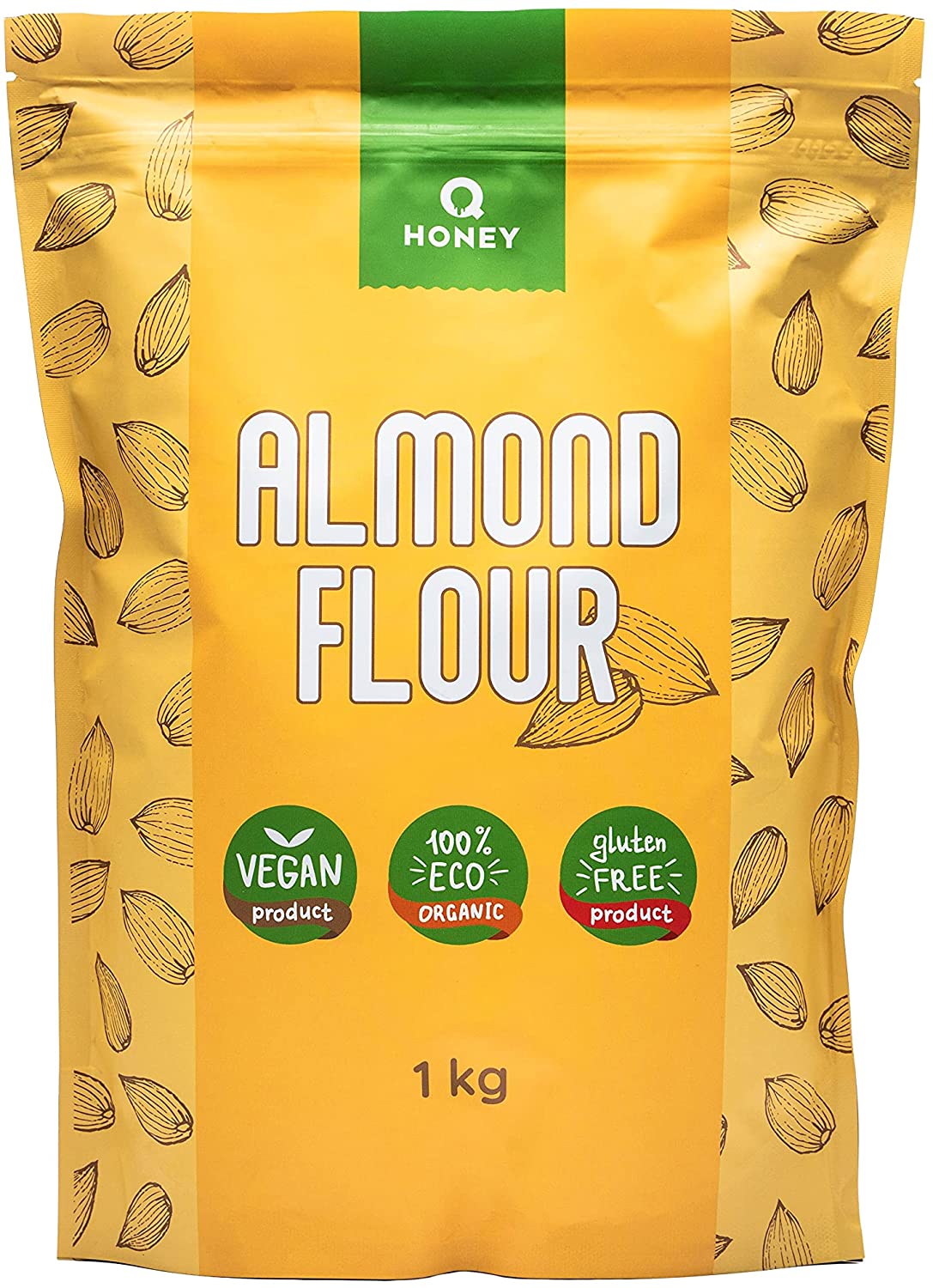
Vegan & Vegetarian-friendly
100% Eco Organic
You should also be aware that the consistency of almond flour is not quite the same as the consistency of plain flour. Baked goods that have been made with almond flour tend to be more dense, and the dough is also a bit thicker and heavier.
7 – Sorghum Flour
If you like the idea of using millet flour, but you’re on the hunt for something a little smaller and more refined, sorghum flour is a great alternative. This one is great for bread, when blended with cornstarch, and also cookies, crepes, muffins, and pancakes. In fact, sorghum flour is the closest to plain flour in terms of both taste and texture.
When the recipe calls for wheat flour, sorghum flour will provide a similar taste, but the finished result might look a tad darker in colour than you were expecting.
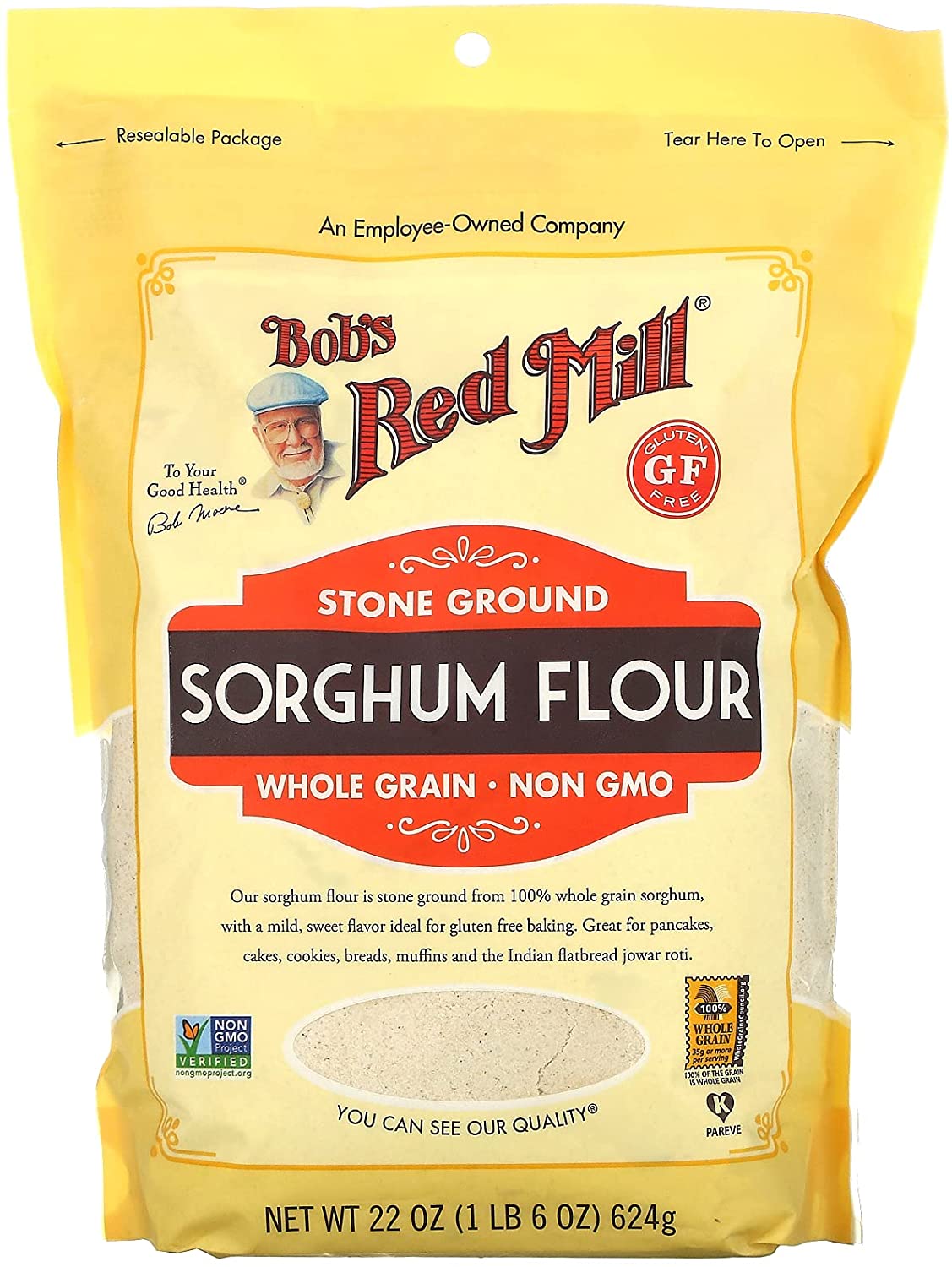
Gluten free
Wheat free
Dairy free
Non GMO
8 – Arrowroot Flour
Also known as arrowroot powder and arrowroot starch, arrowroot flour is not just gluten-free: it’s also safe to eat for those following the Paleo diet, and it’s grain-free, too.
As well as being used as a type of flour, arrowroot flour is a great alternative to cornstarch, but when using it as a flour replacement, you have a lot of options, including frying, roasting in the oven, and baking cakes and breads, etc.
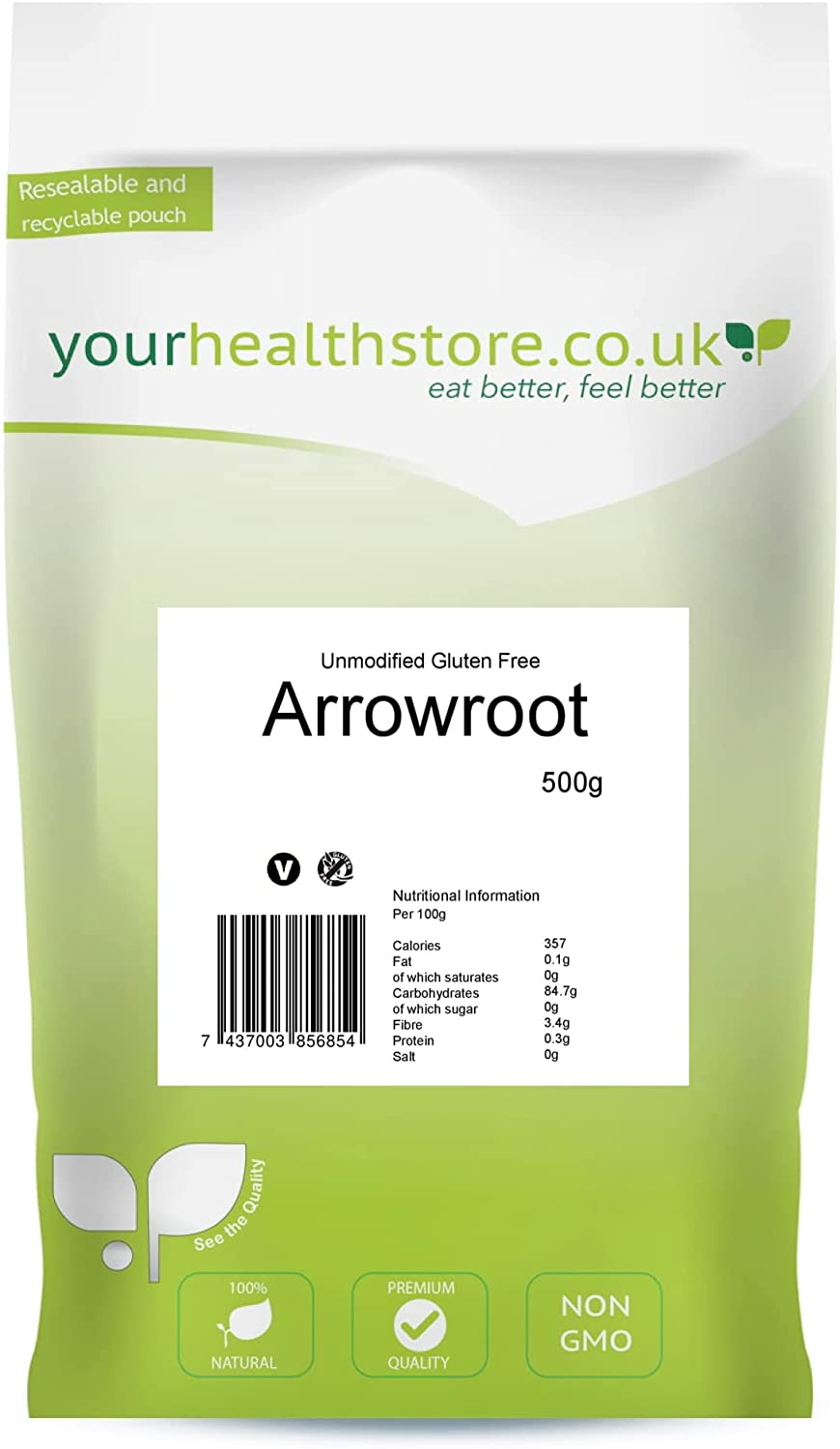
Vegan & Vegetarian-friendly
100% Natural
Non GMO
Gluten Free
British Brand
Most people choose to use arrowroot flour as a cornstarch substitution, or in a mix with other gluten-free flours.
9 – Buckwheat Flour
If you’re baking bread or another product that uses yeast, buckwheat flour (naturally gluten-free, despite what the name might suggest) is a great alternative to plain flour. This type of flour can also be used in certain types of cakes (pound cakes), muffins, waffles, pancakes, and crepes, too.
When replacing plain flour, it is best to use 50% buckwheat flour and 50% of another type of gluten-free flour, such as any of the other flours on this list.
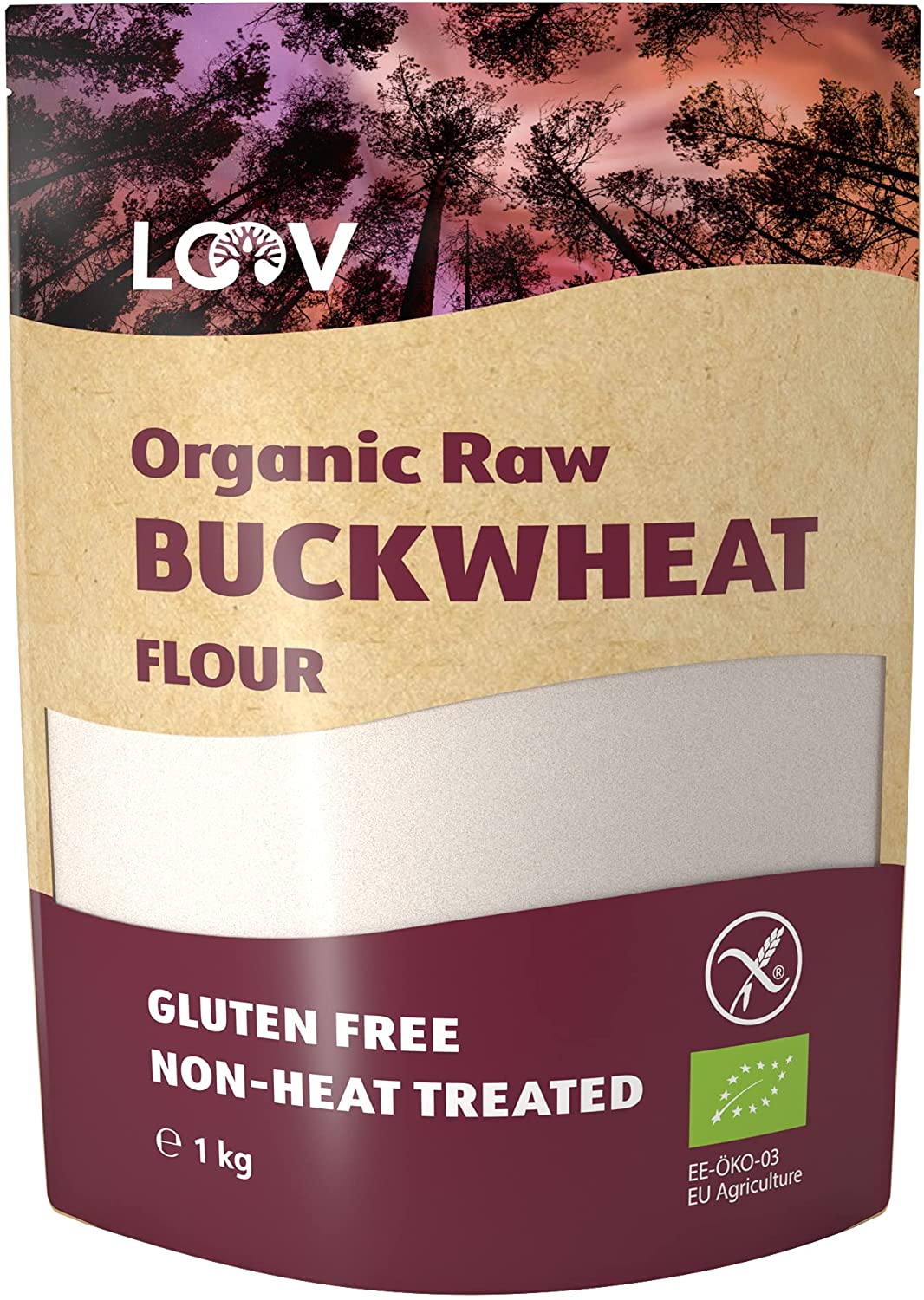
Gluten free
Non-heat treated
100% EU Organic
10 – Amaranth Flour
This one probably isn’t the best plain flour alternative if you’re baking something sweet, such as a cake. Amaranth flour has a taste that is better suited to savoury dishes, often described as quite ‘earthy’ and ‘grass-like’.
Best used as a thickening agent for sauces or soups, as well as pizza and savoury bread doughs, amaranth flour is quite thick and dense when compared to plain flour. Because of this, it is generally used as a plain flour alternative in a mix with other gluten-free flour types, incorporating no more of 25% amaranth flour.
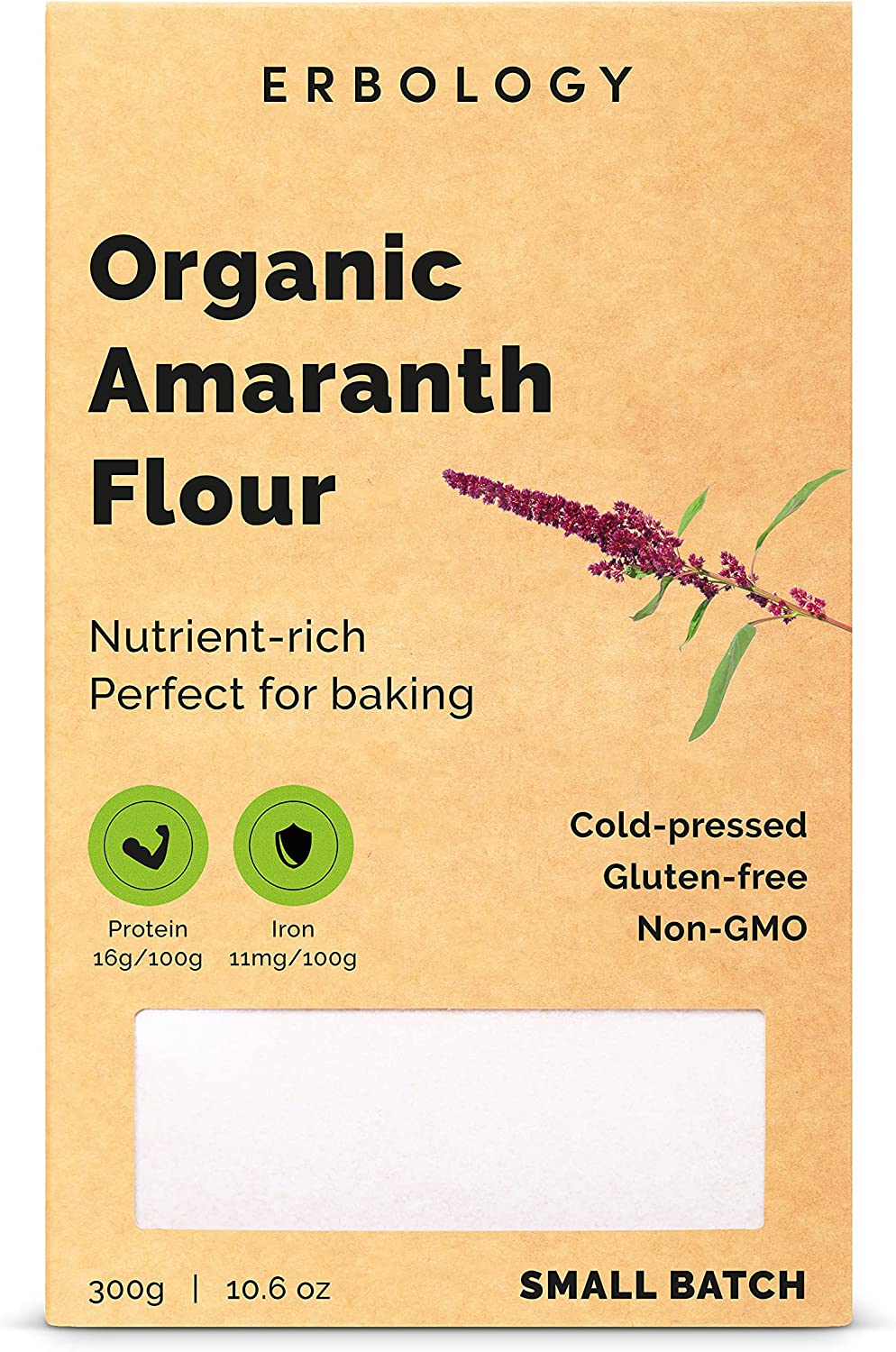
Vegan & Vegetarian friendly
Gluten free
Cold-pressed
Non GMO
So, for example, if you need 100g of plain flour, you can use 25g of amaranth flour mixed with 75g of almond flour as a substitute. If you use more than around a quarter, you may find that the dough will be too thick, and the finished result too dense and heavy.
11 – Oat Flour
Any recipe that calls for eggs will work well with oat flour, but certain dishes, such as pancakes, may need a little sitting time before the batter can be cooked.
You will also want to ensure that your gluten-free flour mix contains no more than 20% oat flour for best results, and check that your oats or oat flour are gluten-free to start with. Some of them are not, because of the places they have been manufactured in and the potential cross-contamination.
If a recipe calls for 100g of plain flour, you could use 20g of oat flour mixed with 80g of another flour/other flours from this list.
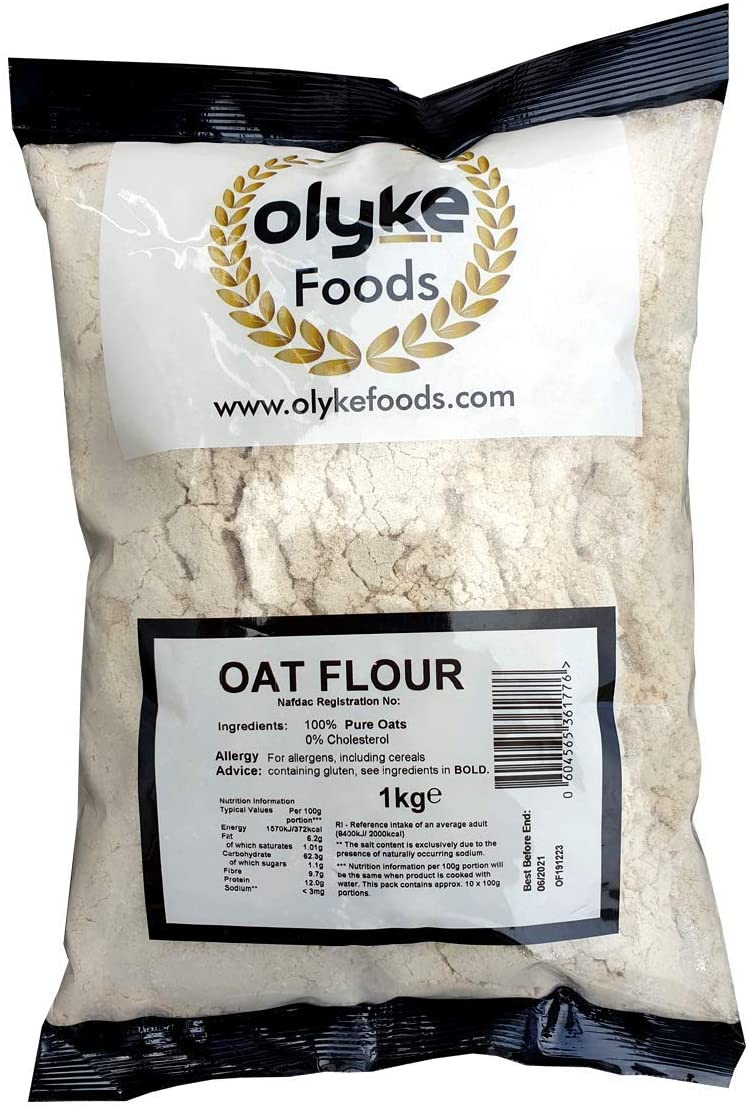
Vegan & Vegetarian friendly
Gluten free
No artificial colours or flavours
Suitable for Kosher, Halal, diabetic and low sugar diets
12 – Chickpea Flour
Unlike with oat flour, you will need to use a little less chickpea flour when using it as a substitute for plain flour. If the recipe calls for 120g of plain flour, you will want to use 90g to 100g of chickpea flour.
Essentially, cooking with chickpea flour instead of plain flour will actually work out to be more economical!
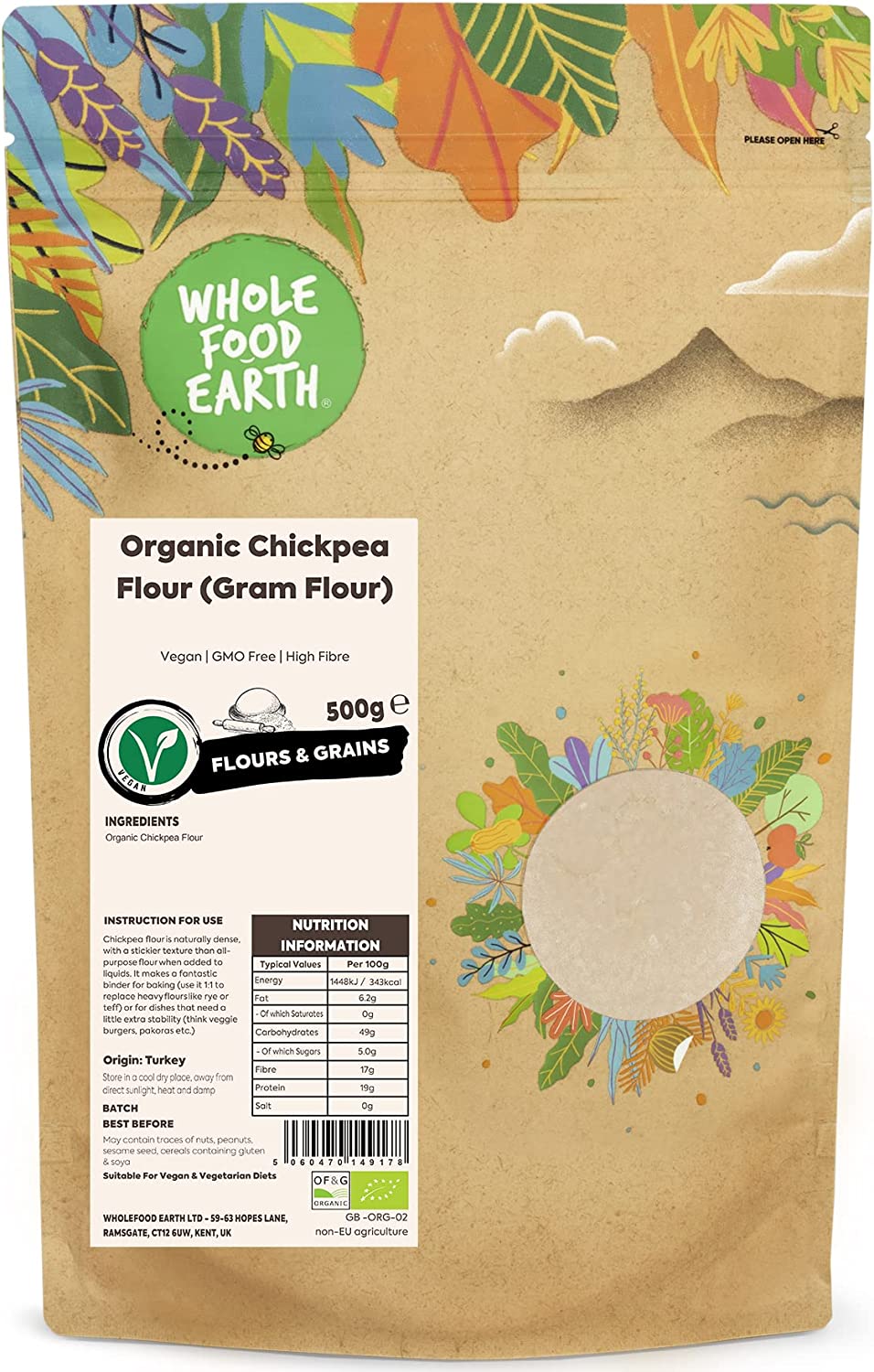
Vegan & Vegetarian friendly
Gluten free
Organic
Non GMO
13 – Teff Flour
As well as being gluten-free, teff flour is also high in dietary fibre, calcium, and protein, and it has a nutty, deep-sweet taste that can really bring the flavours together in sweet dishes and baked goods.
Because of the molasses-like taste and the way it reacts to heat and other ingredients, it is recommended to use teff flour as just one-quarter of your flour total, mixed with other gluten-free flour varieties.
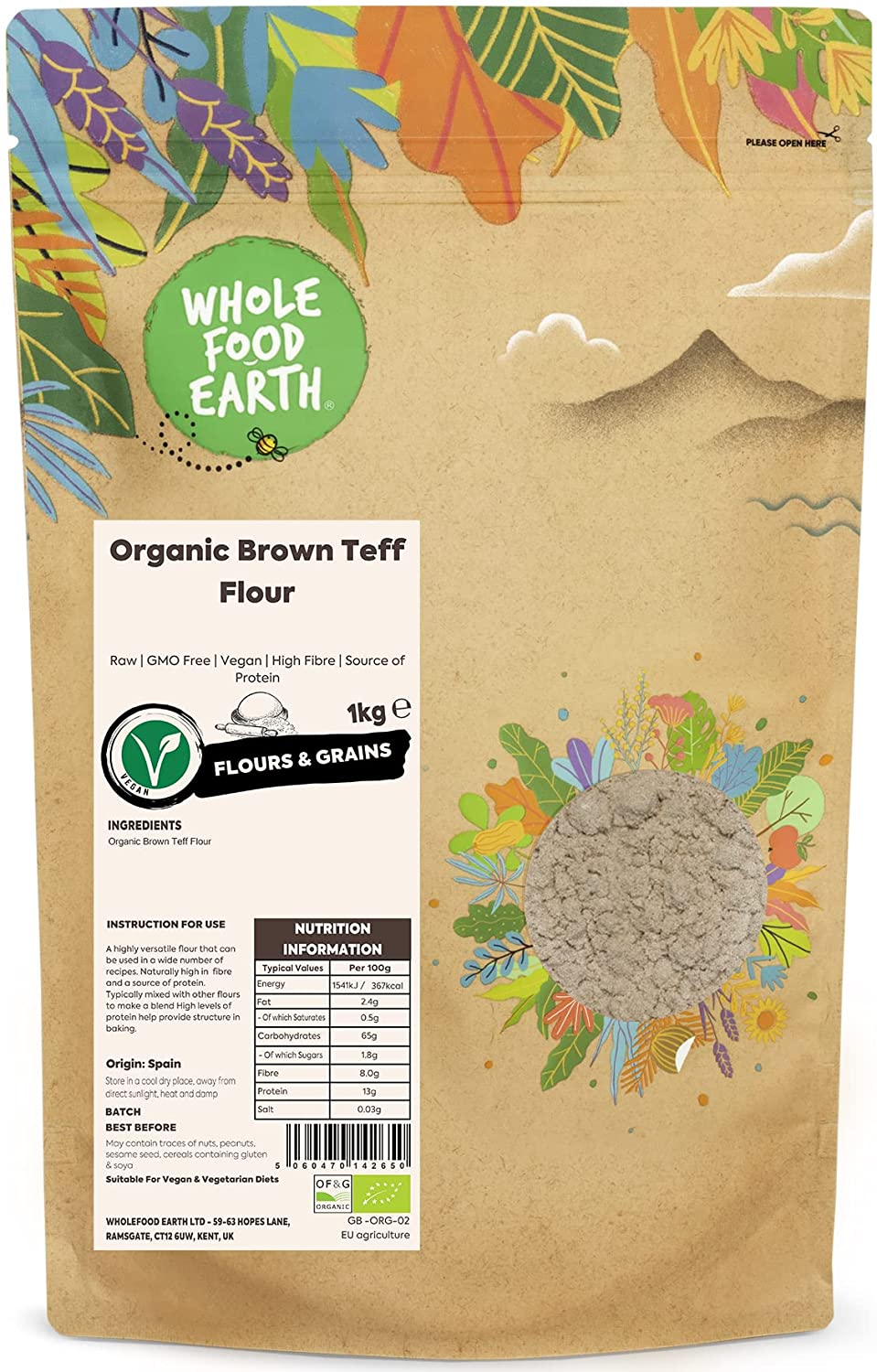
Vegan & Vegetarian friendly
Gluten free
Organic
Non GMO
So, if a recipe calls for 100g of plain flour, you can substitute it for 25g of teff flour plus 75g of almond flour (for example).
14 – Brown Rice Flour
Brown rice flour is another great alternative to plain flour, especially if you’re looking for a gluten-free option. You won’t need a 1:1 straight swap with this one, though. In fact, you’ll need to tweak your recipe a little bit.
To start with, brown rice flour absorbs more water or fluid than other types, so you will need to add a little more of whatever water/fluid your recipe requires. Otherwise, your finished product will be dry and dense rather than light and fluffy.
Secondly, you will want to use slightly less brown rice flour than what the recipe calls for in plain flour.
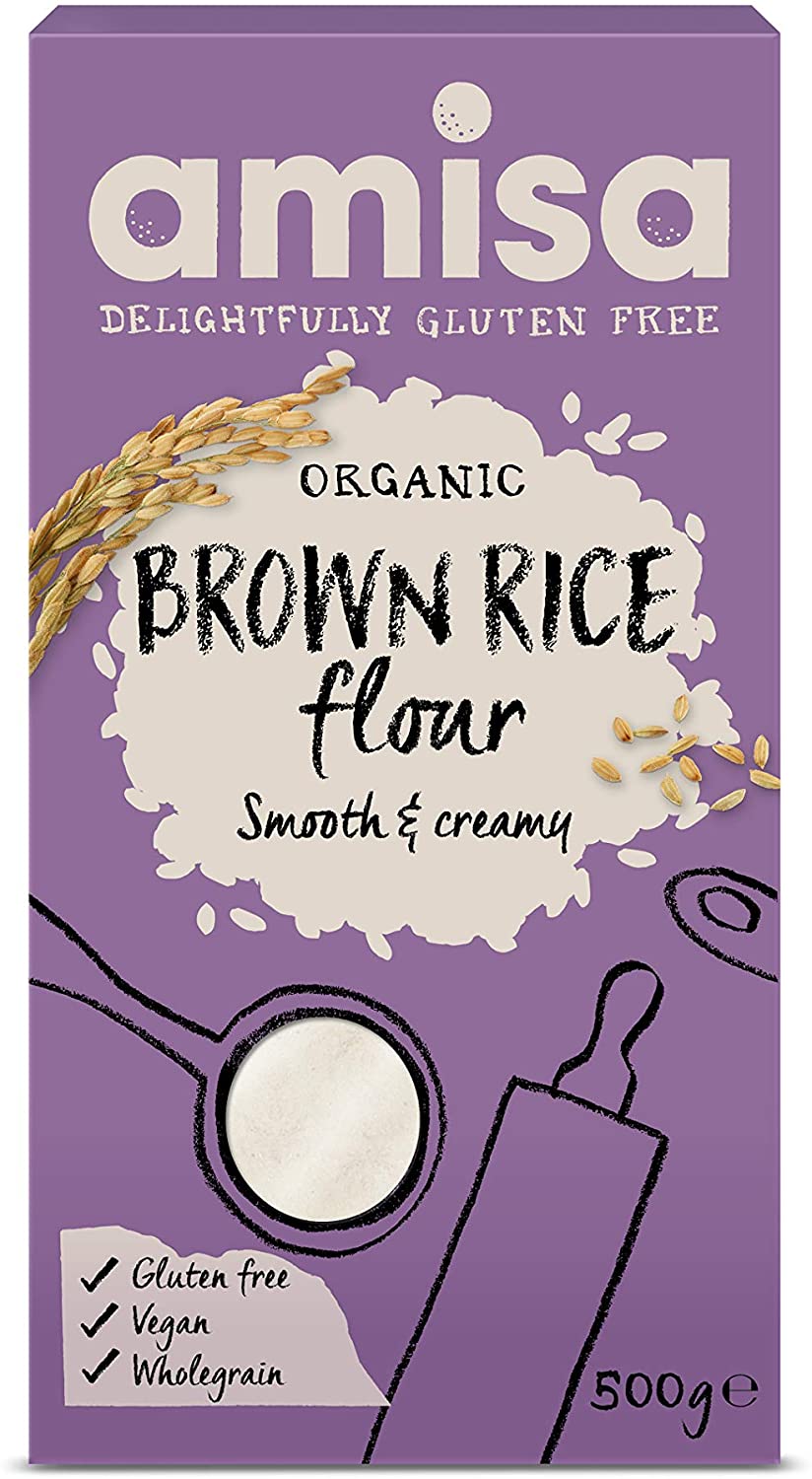
Vegan & Vegetarian friendly
Gluten free
Organic
Fine milled
If the recipe calls for 100g of plain flour, you will want to substitute it for 75g to 100g of brown rice flour – and you will need to add more water/fluid.
15 – Cassava Flour
Just as with brown rice flour, cassava flour absorbs quite a lot of moisture or fluid, so you will want to add more water/fluids than the recipe calls for.
You can, however, straight swap plain flour for cassava flour in a 1:1 swap. It does absorb more water than plain flour, but cassava flour is also a lot lighter.
You may be required to play around a little with the recipe amounts before you find something that works when switching plain flour for cassava flour.
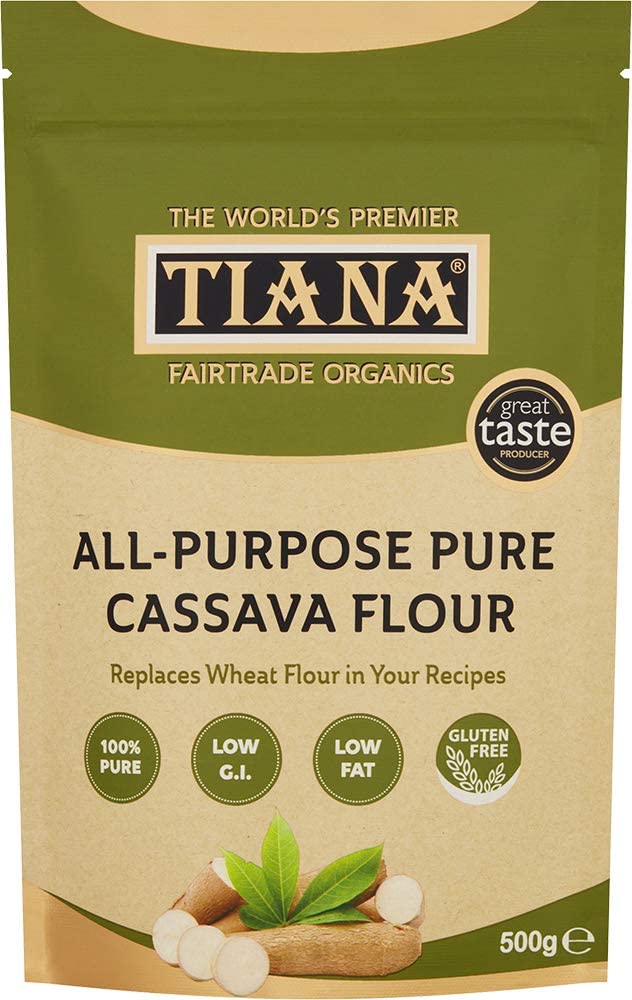
Vegan & Vegetarian friendly
Gluten free
Organic
Low fat
Low G.I.
16 – Tapioca Flour
Tapioca flour is actually made from cassava, which is a root vegetable – and the same one responsible for cassava flour.
If you’re whipping up a nice bath of cookies or a delicious cake, you will not want to use a straight 1:1 swap of plain flour for tapioca flour. If you do, the finished dish is likely to be quite heavy, dry and/or gummy or stodgy, depending on what you’re making. Generally, it is used as a thickening agent, and is commonly used as a replacement for cornstarch.
If you’re using tapioca flour to make gravy, pie fillings, or other types of sauce, you can simply add whatever the recipe calls for in plain flour in a straight 1:1 swap.
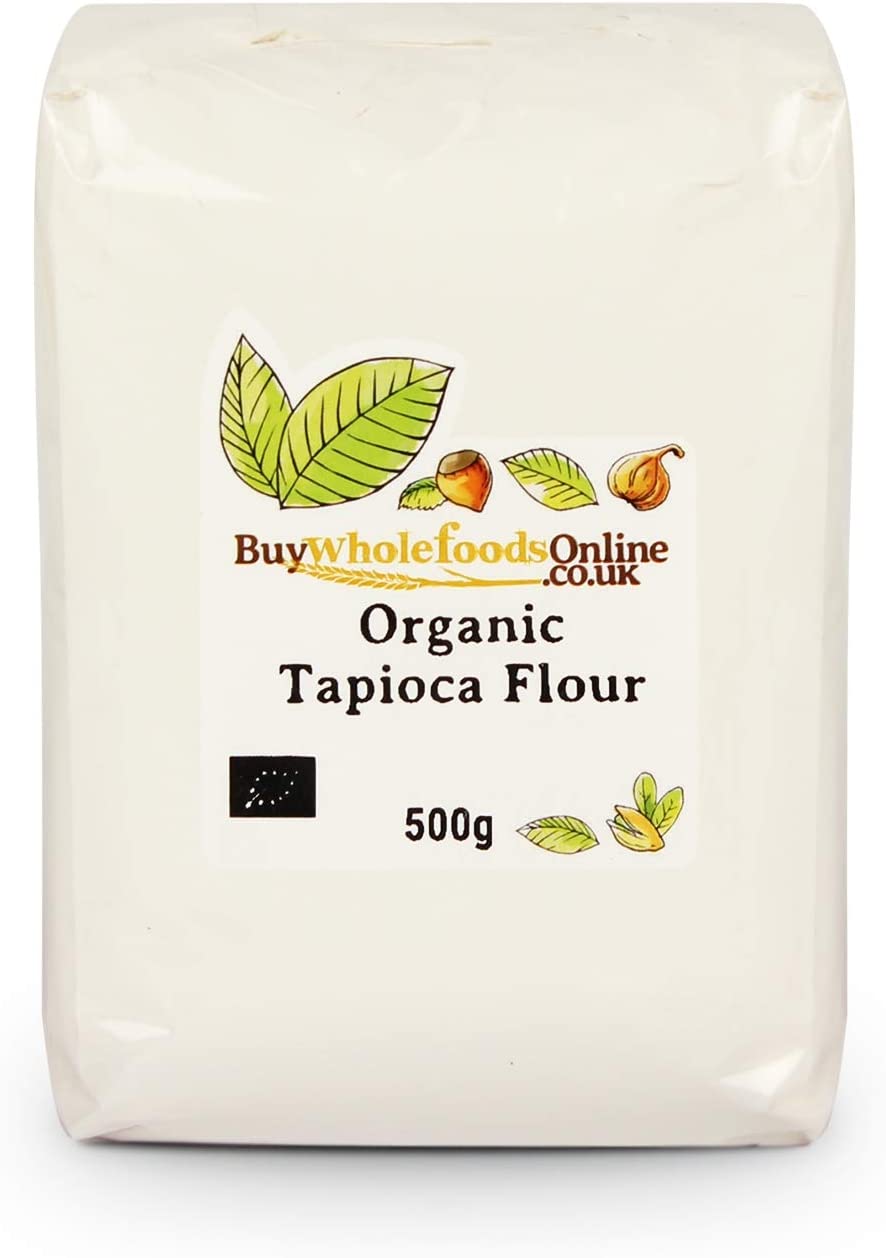
Vegan & Vegetarian friendly
Gluten free
Organic
Low fat
One great way to use tapioca flour as a substitute for plain flour, is to use it as the flour you use in crispy coated and fried foods. Just remember to use an air fryer, if you have, to make it even healthier.
17 – Black Bean Flour
If you’re on the hunt for a gluten-free plain flour alternative that is great for use in baking brownies, black bean flour is definitely one to try. As you can probably imagine, it has a rich and earthy (sometimes called ‘beany’) flavour to it, making it the perfect type of flour to use in chocolate-based recipes.
It is not ideal to use in plain cake or brownie recipes, as the earthy-beany flavour might come through and distort the end result. Because this variety of gluten-free flour is quite dark in colour, the finished cake or baked good will also be darker than expected.
Most people would blend this with another type of gluten-free flour, such as almond flour, with one-quarter to one-half of the flour as black bean flour.
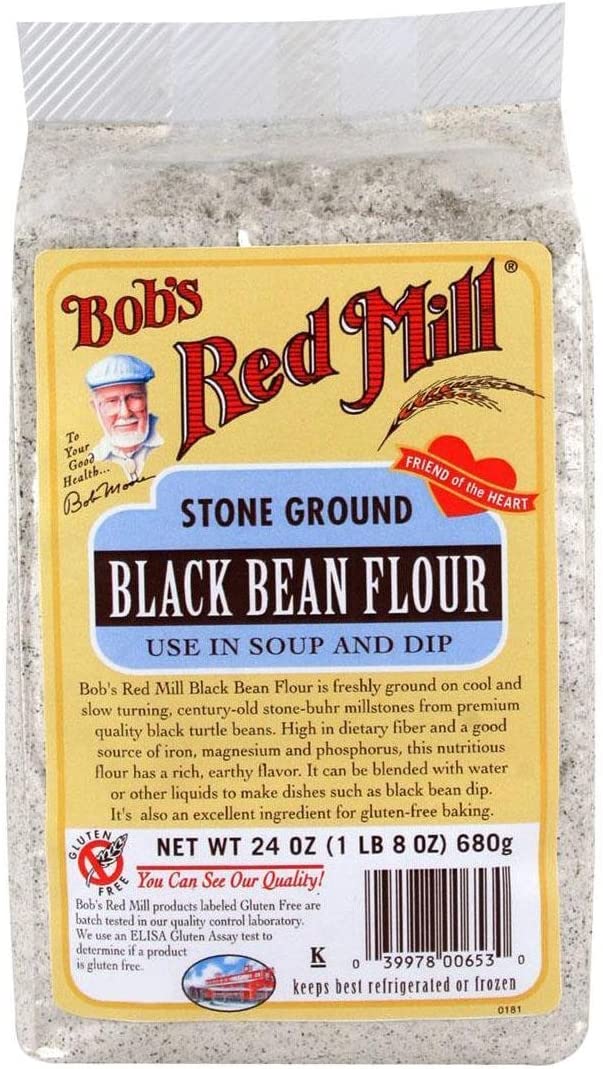
Vegan & Vegetarian friendly
Gluten free
Stone ground
So, if the recipe calls for 100g of plain flour, you could use 50g to 75g of almond flour along with 25g to 50g of black bean flour as a gluten-free alternative.
18 – Tigernut Flour
This one seems to have struck up a bit of a debate on the internet, with some people believeing that tigernut flour works well as a gluten-free plain flour alternative, and other people believing that it doesn’t work well at all.
I guess this one is down to personal preference?
If you’re making something like a quick bread, chocolate cookies, cakes, or muffins, you can probably use tigernut flour in a 1:1 swap without any concerns, but you may want to give this recipe substitution a practice try first. Some people find that other aspects of the recipe will need tweaking when you switch plain flour for alternatives.
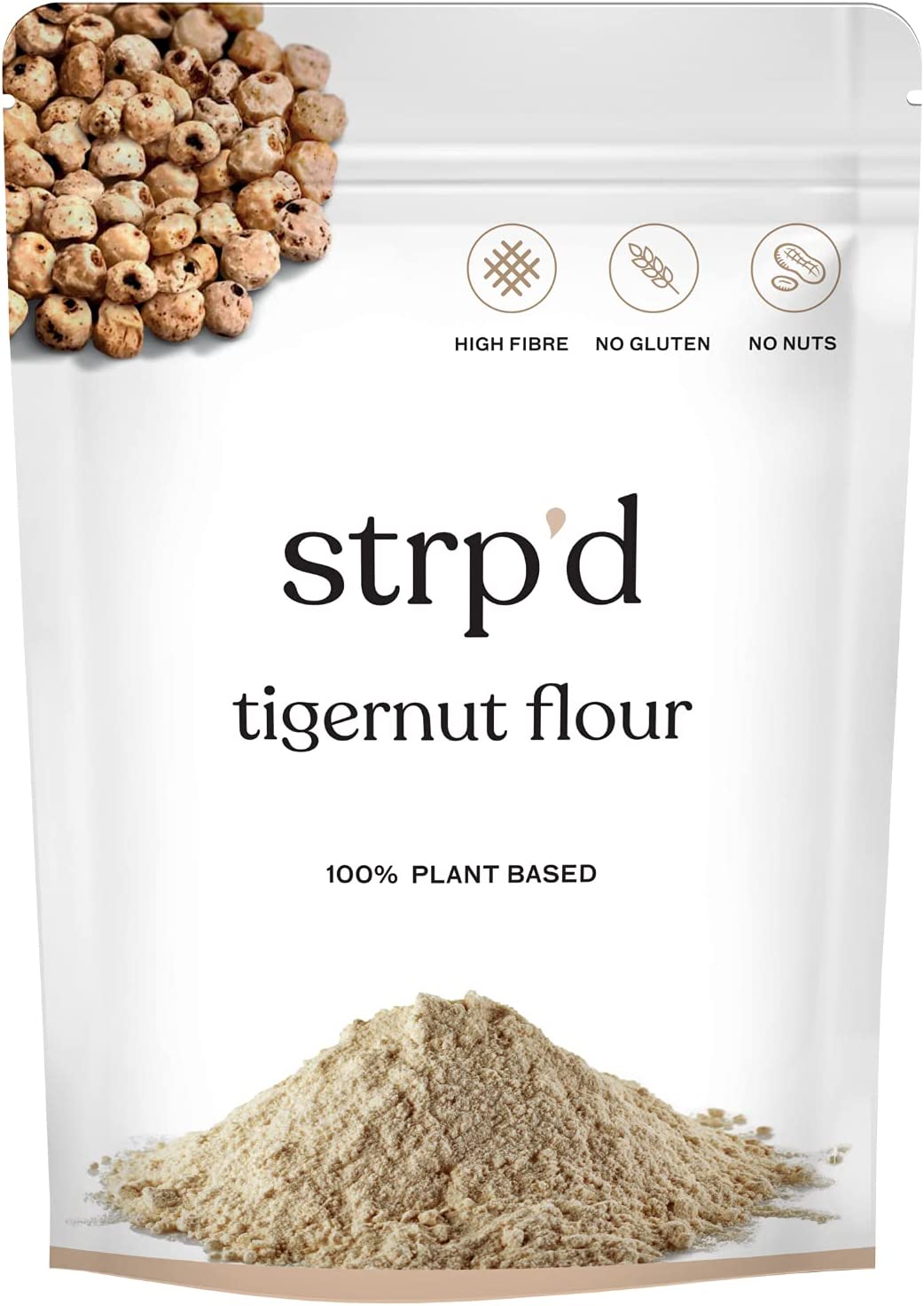
Vegan & Vegetarian friendly
Gluten free
Low calorie
It is quite a dry flour, and it isn’t really known for its great absorbing qualities. Because of this, you may wish to consider adding a ratio of 50% tigernut flour and 50% of another type of gluten-free flour. Otherwise, you may find that things fall apart and crumble rather than sticking together.
Despite the name, tigernut flour is not made from nuts, therefore it is perfectly safe for those suffering from nut allergies.
19 – Sweet Rice Flour
Sweet rice flour, which is not the same as regular rice flour, is great for certain dishes, particularly Asian ones. It is commonly used in dumplings, mochi, and rice noodles, and it’s also added to gravies, sauces, and fillings for pastries and pies to thicken them up.
This type of plain flour substitute is very sticky to work with, so it’s not a great substitute for all dishes. Just as with some of the other alternatives to plain flour on this list, you may wish to practice with sweet rice flour to get the flour amounts just right.
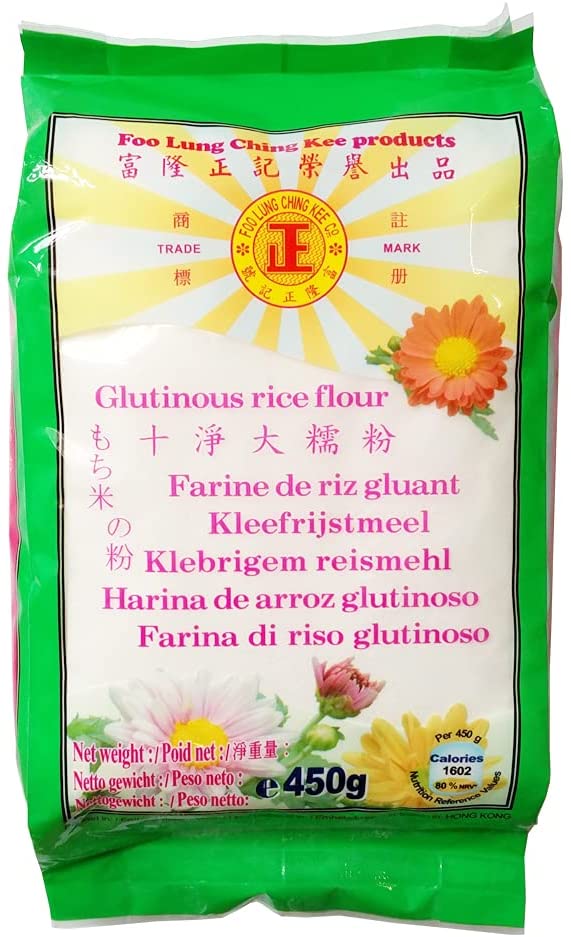
Vegetarian friendly
Gluten free
Sweet rice flour is actually one of the flours blended together to create a popular gluten-free baking flour mix in the United States. Bob’s Red Mill Gluten Free 1 to 1 baking Flour, as the name suggests, is a gluten-free type of flour that is suitable for baking, that can be used in a straight 1:1 swap.
20 – White Rice Flour
Sweet rice flour and rice flour are not the same thing – but they can both be used as gluten-free alternatives to plain flour in certain recipes.
Because rice flour doesn’t contain the same amount of gluten as plain flour, the recipe won’t work in the same way. Because of this, it is recommended to create a blend of gluten-free flours, where rice flour is part of it. Rice flour mixes particularly well with tapioca flour for cakes and bread recipes.
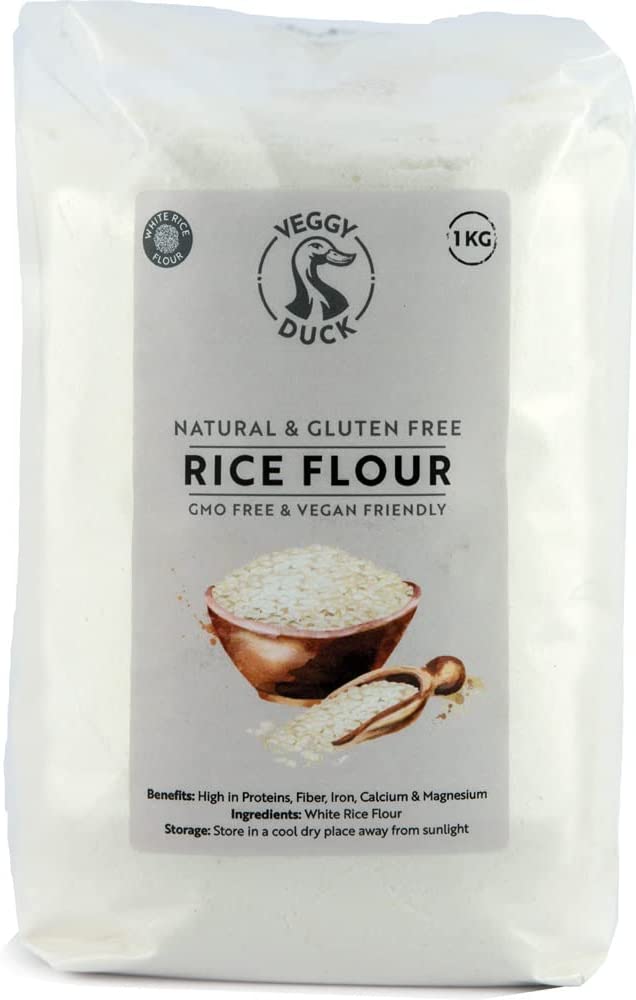
Vegan & Vegetarian friendly
Gluten free
Non GMO
100% Natural
21 – Chestnut Flour
For some baked goods and dishes, you can simply replace plain flour with chestnut flour in a straight 1:1 swap, but this only works for things like pasta, crusts for pies, and even pancakes. If you want to make something else, such as cakes, cookies, or muffins and cupcakes, you will need to blend chestnut flour with another type of gluten-free flour to get best results.
The thing about chestnut flour is that it tastes quite like chestnuts – very nutty, bold, rich, and earthy. These flavours will be transferred to your dish, so that’s why you’ll want to ‘dilute’ the flavour, as such, with other types of flour, if you don’t want that bold, nutty flavour peeking through.
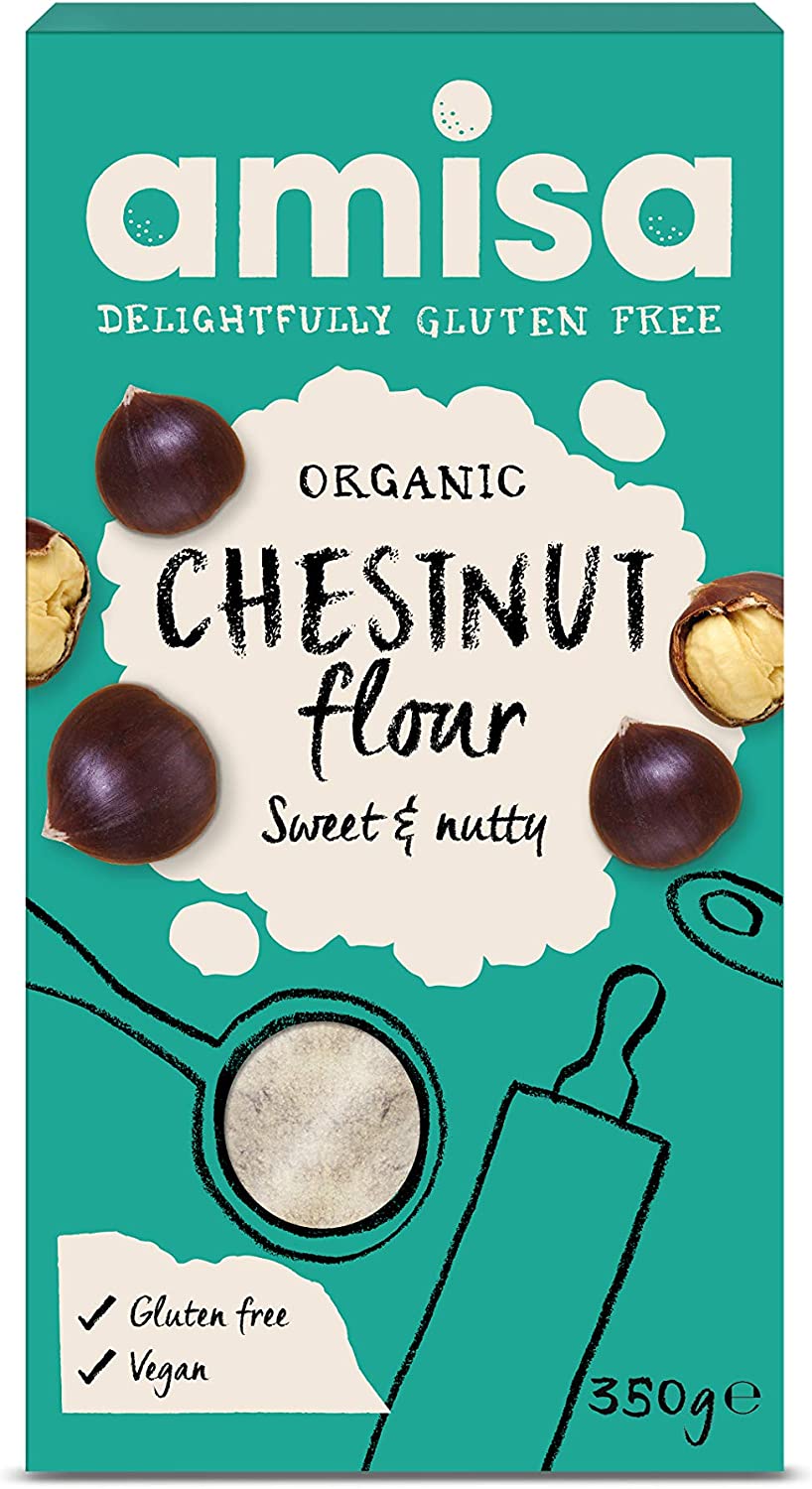
Vegan & Vegetarian friendly
Gluten free
Organic
22 – Flaxseed Flour
Flaxseed flour won’t be a great substitute for plain flour in certain recipes, in a straight 1:1 swap, but you can use it in part of a blend of gluten-free flours. If you are going to make a blend with flaxseed flour to replace plain flour, it is recommended that you use no more than one-quarter of flaxseed flour.
So, if you have 100g of blended flour, 25g can be flaxseed while the other 75g must be almond flour, or another type of gluten-free flour.
Flaxseed flour is naturally free of gluten, but it can sometimes be made in plants where gluten products are also manufactured. I recommend taking a look at the label, and always buy the one that says ‘gluten-free’.
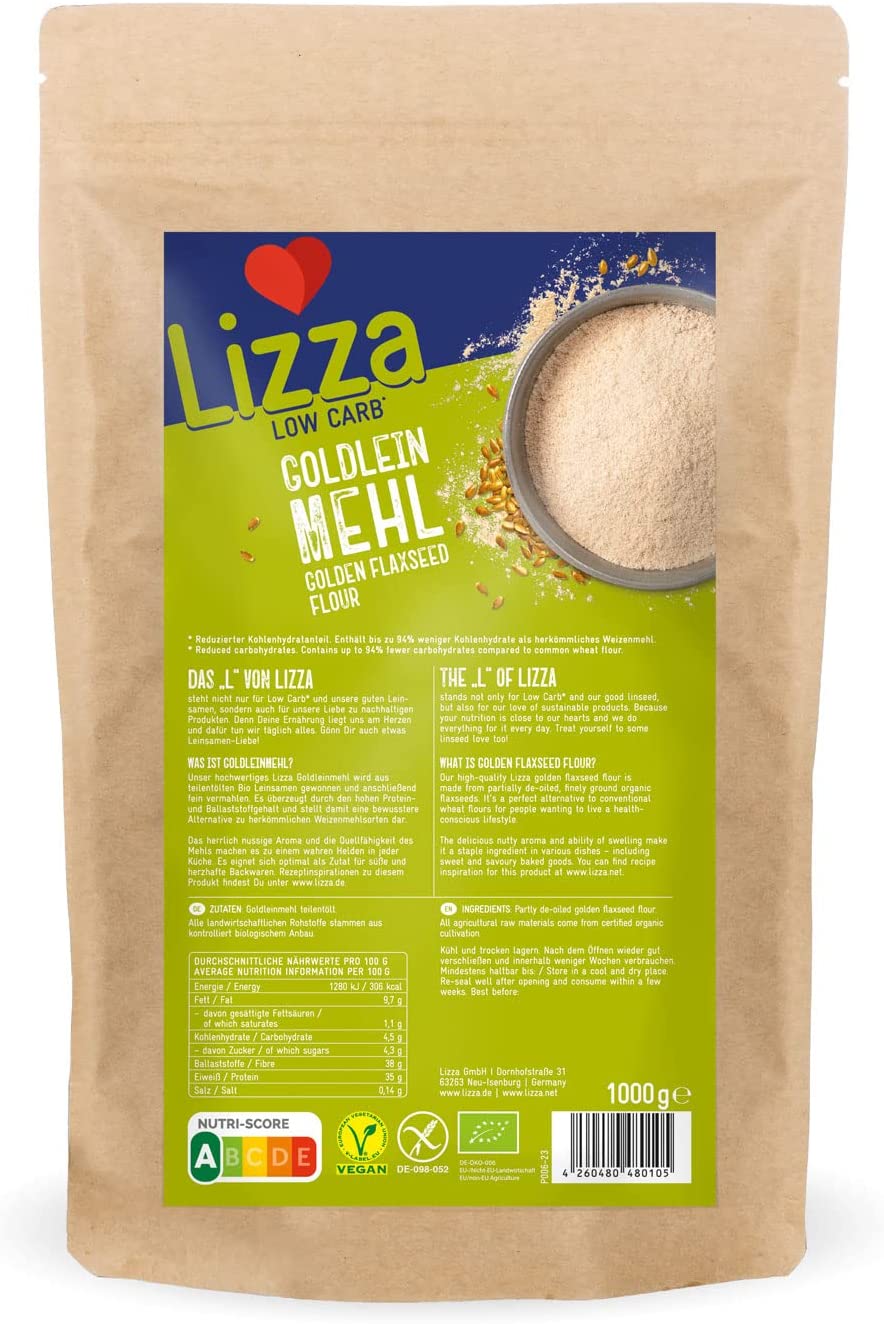
Vegan & Vegetarian friendly
Gluten free
Non GMO
Keto friendly
High in protein
Featured image: Gluten photo created by master1305 – www.freepik.com
